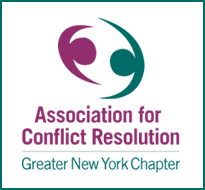|
.png)
.png)
9:00am Mediation will soon be taking centre-stage for resolving disputes in India. While earlier attempts at nudging litigants to consider mediating their disputes have had mixed results, a new legislation seeks a come-back of this traditional, collaborative approach. While giving a specific push to an eco-system for resolving civil and commercial disputes, it also prepares some ground-work for Community Mediation and ODR (Online Dispute Resolution). This presentation will discuss some of the benefits of this new legislation as well as some fillable blanks in the road-map for amicable dispute resolution. 9:55am Neurologists and decision scientists are increasingly aware that cognition occurs throughout the body: we aren't just 'brains in a jar.' In the future, the field of mediation will have to catch up. We can envision a conflict resolution practice where 'coming to the table' could also involve a floor mat. But it isn't right around the corner, either. So: what now? 'Mediation in motion' is an approach that takes the first step: us. The lessons are fun. The slow, gentle, aware movements help our own mediator 'brains in a jar' to become more fully integrated within our entire cognition-producing, outside-the-brain, bodily selves. Attending to one's body is the ultimate practice in active listening. When you 'active listen' to that twinge in your hip, or catch in your breath, or sore eyes, you will also level up in your active listening skills with your parties. Self-care now happens more spontaneously. Mediation in motion lessons also provide useful insights to facilitative mediation. They are surprisingly similar. The discussions after a lesson are rich in insights: can it be easier? How is the timing? How does a different lead change the organization? Walk away--lighter!--understanding your and your parties' whole selves better. 10:55am The City of Dayton's Mediation Response Unit is under the umbrella of the Dayton Mediation Center and is an alternative response team that responds to low emergent 911 calls within the City of Dayton. Their program was formulated after the police reform talks began in 2020 and the working groups identified recommendations for the community of Dayton. They are a team of trained responders with a wealth of experience and certification in areas such as crisis response, de-escalation, conflict resolution and community development and relationship building. This program will bring together the leader of the Dayton MRU, a representative from Dignity Bes Practices, the organization that helped Dayton develop the program, a representative from the AAA-ICDR Foundation, the organization that helped fund the ongoing work of the MRU. If you are interested in how mediation can be leveraged to create an innovative and effective alternative police response, come learn about this critical program. 11:50am Surrounding the core of the ADR practitioner’s skills in any matter is a context of administrative tasks, steps for proper preparation, client communication, document and file management, drafting, scheduling, billing and more. Technology touches on every aspect of this context, and the context affects the services the practitioner ultimately provides. This panel discussion brings together an exceptional set of perspectives on technology and dispute resolution including; Dario Higuchi, CEO of Signature Resolution, a major California-based ADR firm, Brian Epps, private practitioner, mediator and founder of Peacemaker.legal, a software tool for mediators, and Gary Doernhoefer, Co-Chair of the ABA Dispute Resolution Section Technology Committee and the founder of ADR Notable, a case and practice management software designed for ADR practitioners. The panel will focus on how current technologies properly used in the context of ADR services benefit the practitioner and clients. It’s not just about efficiency – technology can impact the quality of the services provided, and overall client satisfaction with the process. But technology is double-sided and the panel will identify risks and ethical issues arising from today’s technology as well. 12:50pm Embark on a captivating exploration of the intricacies surrounding co-parenting in the face of religious differences. This session delves into the unique challenges and opportunities parents encounter as they navigate the delicate balance of raising children with diverse religious beliefs. Religious disparities manifest as issues wherein participants' fundamental beliefs remain unchanged. Our focus is on providing insights into coexisting in a world with differing perspectives, fostering understanding rather than altering core beliefs. The presentation unfolds the art of mediation, empowering participants with the understanding and comfort to navigate conflicts stemming from religion, politics, and beyond. Attendees will acquire practical strategies for resolving seemingly insurmountable conflicts. Join us for an enlightening and thought-provoking discussion that empowers voices and encourages thriving in a world of diverse views. 1:45pm This presentation celebrates the unique contributions that returning citizens make to their communities after prison. For example, youth at risk of offending may benefit from learning directly from the life experiences of people who have faced challenges in life, including incarceration. 2:40pm From Reinventing Government and aviation’s transition to satellite-based technologies to the New York City (NYC) Departments of Probation, Homeless Services and Correction, and the Maryland Department of Juvenile Services, the presenter has delivered strategic plans to each of these organizations. The lessons are: 1: You gotta have a plan; 2: Leadership matters; 3: Deep and broad partnerships are key; 4: The hidden ecosystem of community life; 5: The transformational power of investing in community–based services, supports and opportunities; 6: Measure outcomes — reducing crime, violence, and recidivism, while increasing productive engagement for young people and their families; 7: More humility, please. In summary, the lessons point to a systemic approach to creating and implementing a realistic multi-partner plan for redirecting the lives of young people caught up in our criminal justice systems. 3:35pm The Philadelphia Commission on Human Relations (PCHR) is the oldest municipal government civil rights agency in the US and is known as the City of Philadelphia’s “peacemaking agency.” It was established in 1951—over 10 years before federal civil rights laws—to ensure those living, working, or visiting Philadelphia were protected from discrimination. With racial social movements like “Black Lives Matter” and the rise of hate and extremism, the PCHR formed the Philadelphia Civil Rights Rapid Response Team (PCRRRT) in 2016—a partnership of federal, state, and local government agencies and law enforcement; and key community partners—to address issues arising from hate and bias. As a result, there were several outcomes, including: various immigrant communities expressing feeling safe from acts of hate; improved collaboration between government and community around hate crime prevention; and the creation of a program to empower community leaders to engage in racial dialogue. |








